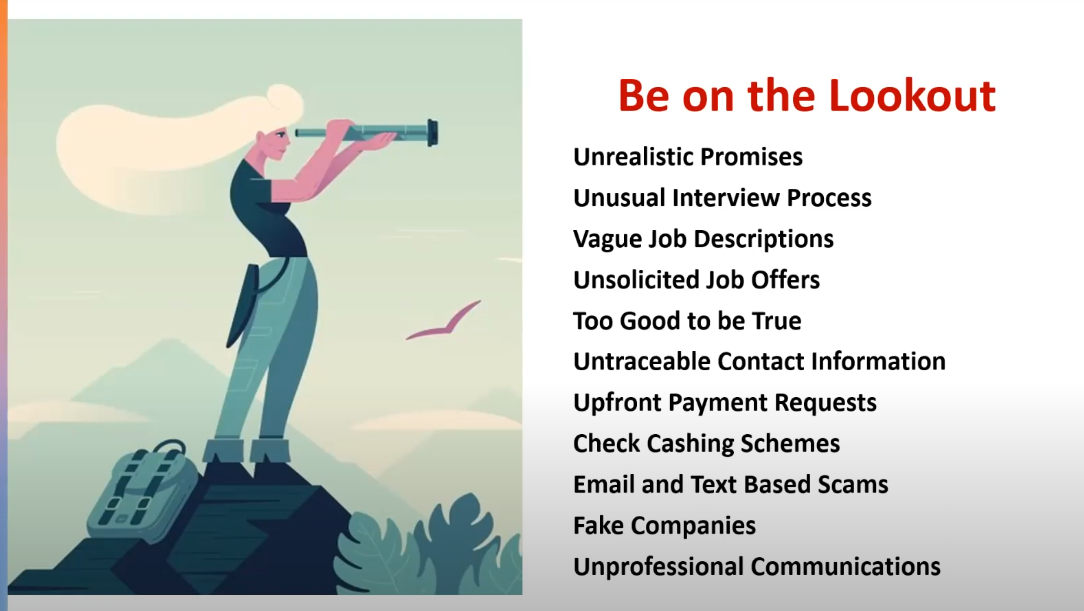Employment Scams – Another Way To Steal Your Money And Your Identity
Introduction
By now, everyone knows how cybercriminals use online scams to defraud or otherwise take advantage of victims for personal gain. A growing sector of these criminal activities involves Employment Scams.
Scammers reach out to people that are in transition and looking for their next job. Many people in this position are anxious to get back to work and may be vulnerable to the promise of what seems like a good opportunity to start a new job as soon as possible.
Scammers disguise themselves as recruiters, hiring managers, and job search websites (think Indeed, Monster or LinkedIn). They set up fake onboarding portals, or fake websites. They will contact you directly through email, text messages or phone calls. You have to be on your toes and alert to the reality that these scams will come your way.
Mr. Simon has your back! We’re here to help you to understand the many schemes that are out there, what red flags and telltale signs to be aware of and how to react when faced with what looks legit but most certainly is not.
An Historical Perspective on Employment Scams
For many years prior to the digital age, most job hunters would read local and national newspapers for work opportunities. The classified sections of the Sunday NY Times and the Tuesday Wall Street Journal were filled with hundreds of legitimate want ads seeking job hunters at all levels. It was during this time that scammers were also reaching out to job hunters with what were known as “work from home” schemes. They would place ads in newspapers or magazines, tempting people to respond in the hopes of earning extra money. Here’s an example of what one would have looked like in 1970:

The are several “Red Flags” in the ad that suggest this was a scam:
- They offered these jobs even when there was little need for a company to have people do a job like this from home, given all of the trouble and expense of shipping the materials to the workers and managing people and expenses at a distance
- Although it does not seem like very much today, back in 1970 $75.00 per week for “stuffing envelopes” probably looked like pretty good money.
- “All materials and instructions provided” and “no experience necessary,” sounded good, but at what cost to the worker
- The terms “limited positions” and “don’t miss out” suggest pressure to respond right away.
As we will see in today’s digital marketplace, it is unlikely that there was ever a real job. Gullible job seekers were asked to send money to the company for supplies such as envelopes, advertising, and postage (to mail all of those envelopes) and training. In many of these cases, the victims would never receive anything in return for the money they sent to the company.
Just What is an Employment Scam?
Employment Scams, also known as Job Scams, are deceptive and fraudulent schemes in which individuals or organizations pose as legitimate employers or recruiters to trick job seekers into providing both personal and financial information or money under false pretenses.
Employment scams are among the top 5 five financial frauds reported to the Federal Trade Commission. In 2022 approximately 14 million people were exposed to such scams and in that year job seekers who fell for the various schemes lost approximately $68 million.
Some of the Most Common Scams
The following are some but not all of the scams that are out there. Please read through them as they should give you a good idea of the methods that are currently in use. The best way to avoid becoming a victim of these scammers is to know what they are up to.
Envelope Stuffing – Yes, this one is still going strong. Just like the old advertisement we saw earlier the “employee” is often required to pay an up-front fee for materials and/or training. In these cases, they receive neither and are out the fees they already paid. By the time they realize what happened, the scammer has moved on to a new scheme and the victim has little or no recourse.
Home Assembly – In this case the victim is led to believe they will assemble items at home for sale by the manufacturer. They are asked to send money up front for supplies that they may never receive, or they may receive supplies of worthless materials that they cannot actually assemble into products anyone would want to buy. In either event, they are out the money they spent with little chance of recovering their cash.
Email Solicitations – Often contain requests for personal and financial information right up front. No legitimate employer would need your social security number or your banking information before a formal job offer is made, and you start working for them.
Unsolicited text messages - are received in much the same way as emails. In these cases the recruiter asks you to download a messaging app in order to conduct the job interview. The job seeker never sees or speaks with anyone from the employer. You should delete these texts and stop all contact with them immediately.
Fake job postings - At first glance, these appear to be genuine job postings. They may appear to be from legitimate job platforms (think Indeed, Monster, etc.) or directly from a real company. They may also ask for personal/financial information or some form of upfront payments as part of the hiring process. Also, fake government and post office jobs may arrive this way.
Reselling merchandise is a popular work-from-home scam in which the victim buys “so-called” luxury merchandise at a discount, to resell at a higher price. The scammer may offer to provide the reseller with a list of preferred customers. The victim either never receives the goods, or the merchandise turns out to be unsellable junk.
Fake recruiting agencies may reach out with unsolicited job offers. Be especially vigilant if there is any request for personal information or upfront payments.
Foreign job scams offering lucrative overseas job opportunities are often aimed at Gen Y and Gen Z job seekers who may be looking to travel or Boomers who may be enticed by the idea of moving to cheaper and warmer places to work and eventually retire.
Be on the Lookout

Employment Scams will come at you in many ways and in many disguises. It is most important that you recognize them for what they are and learn to avoid them whenever possible. Be on the lookout for:
Unrealistic promises such as a promise of a fast track to senior leadership.
Unusual interview process such as an interviews that are not conducted in person or via video conferencing.
Vague job descriptions with not enough detail, or the description doesn’t seem to match the job title.
Unsolicited job descriptions where offers seem to come out of nowhere and are usually very flattering.
Too good to be true. This goes without saying.
Untraceable contact information that cannot be confirmed.
Upfront payment requests. Never pay for anything as part of a job hiring process.
Check cashing schemes that offer to send you a check to pay for upfront expenses.
Email and text-based offers that come to you unsolicited. Only respond if they come from a source known to you.
Fake companies. Anyone can fake a company, never take a job offer at face value just because the company looks real.
Unprofessional communications often include sloppy formatting, bad grammar, and poor spelling.
Tactics Used by Scammers
Some of the tactics used by scammers include:
- The scammer might use the name of a real person from a real company (they might get the name, job title and company name from LinkedIn). This has all the appearance of legitimacy but since you are most likely never to see or speak to the individual because they use only email or a messenger app, it might be hard to make the connection.
- The job offer seems almost too good to be true. The pay is high for the type of work offered or the work itself is not related to your job skills.
- The recruiter will pressure you to act quickly so as not to lose a great opportunity.
- They almost immediately announce that you are hired and of course as a new hire they need your information such as SS #, DOB, banking information and other personal data in order to process you as a new employee in their system.
Red Flags
- Email addresses do not match the company’s name. In fact they are almost always a personal email address, or if it looks like a legitimate company email it may be off by a letter or has an added number or character.
- Very often scammers do not write well. They misspell words and use poor grammar. The job description may not reflect the job title or may be misspelled.
- The employer does not appear to have a website or an active company profile on LinkedIn.
- The job offer appears unsolicited in your email or text inbox. They often tell you that they have seen your resume, and you are perfect for the position. They never say how they happen to have a copy of your resume.
Protecting Yourself
- Check the company’s official website. Does such a job exist? Does the website even exist?
- Compare the job title and the job description in the offer to the one shown on the company’s official website. It should be identical. Identify discrepancies and inconsistencies.
- Contact the company directly through its “contact us” link on the website.
- If you are not sure, reach out to your network, friends and colleagues who may know the company, for their advice.
- Protect Your Personal Information
- Never share sensitive information. Keep your social security, bank details, passport and other personal information secure and never share it.
- Use secure communication channels.
- Verify the sender’s email address.
- Avoid clicking on any links in the email or text
Report the Scam
If you believe that you have received a scam, of course you should ignore it. However it is just as important to report the scam to the authorities and to on-line platforms to help with the fight against them and hopefully stop or at least slow them down. Consider the following:
- Local law enforcement
- The Federal Trade Commission (FTC) at reportfraud@ftc.gov
- Better Business Bureau (BBB) at www.bbb.org/scamtracker
- Job Search websites such as Indeed and others to let them know a possible scammer is using their site for this purpose.
- Notify your email provider of a possible scammer. Report the scam to the legitimate employer.
Summary
Keep these 4 tips in mind whenever you are in your job search. They are helpful in all circumstances, not just when you are avoiding employment scams.
- If you use job search websites, stick with the reputable ones. Sites such as Indeed, Monster, LinkedIn and others can be very helpful. Just be sure that the job offer you receive actually comes from a site you have signed up for and verify the offer for yourself.
- Always protect your private information and keep it secure. Never share it with anyone unless and until you have received a legitimate job offer, in writing, that you have personally confirmed with the company.
- Seek advice from trusted sources. Personal friends, family, colleagues, and the folks in your network are all there to help you.
- Always trust your instincts.
You don't have to be alone in your job search!
Mr. Simon invites you to join the Friends of Mr. Simon Meetup Group that supports both individuals seeking their next job role and working professionals. Members of our network come together to learn and practice new skills and network with others through our regular interactive events where they establish meaningful connections and have a chance to promote their personal brand and stand out in the marketplace.
Group membership is free of charge, courtesy of Mr. Simon.
Join our Friends of Mr. Simon Meetup Group to become part of our growing and supportive community!
